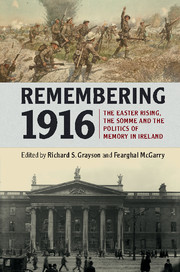Book contents
- Frontmatter
- Contents
- List of figures
- List of tables
- List of contributors
- Introduction
- Part I Memory and commemoration
- Part II Narratives
- Part III Literary and material cultures
- Part IV Troubled memories
- 11 Reframing 1916 after 1969: Irish governments, a National Day of Reconciliation, and the politics of commemoration in the 1970s
- 12 New Roads to the Rising: the Irish politics of commemoration since 1994
- 13 Ghosts of the Somme: the state of Ulster Loyalism, memory work and the ‘other’ 1916
- Index
13 - Ghosts of the Somme: the state of Ulster Loyalism, memory work and the ‘other’ 1916
from Part IV - Troubled memories
Published online by Cambridge University Press: 05 March 2016
- Frontmatter
- Contents
- List of figures
- List of tables
- List of contributors
- Introduction
- Part I Memory and commemoration
- Part II Narratives
- Part III Literary and material cultures
- Part IV Troubled memories
- 11 Reframing 1916 after 1969: Irish governments, a National Day of Reconciliation, and the politics of commemoration in the 1970s
- 12 New Roads to the Rising: the Irish politics of commemoration since 1994
- 13 Ghosts of the Somme: the state of Ulster Loyalism, memory work and the ‘other’ 1916
- Index
Summary
The phrase that was developed inside the blocks was Tiocfaidh ár Lá. Tiocfaidh ár Lá literally means ‘Our day will come’. So Republicans are looking forward to events, to change, to progress, to winning; however you term it … And I think Unionism, sadly, is looking back to what it had, to what it was like, to what it was like then.
A spectre is no longer haunting Ireland. A ghost has been exorcised. Grass-roots ‘rediscovery’ of those Irish Nationalists who fought for Britain between 1914 and 1918 has contributed to ending what F. X. Martin called Ireland's ‘collective amnesia’ about its role in the Great War. Embracing this process of rediscovery and rapidly transitioning from the merely perfunctory to the openly celebratory, state ceremonies of remembrance in the South – including the joint inauguration by the Irish President, Michael D. Higgins, and Prince Edward, Duke of Kent, of a new ‘Cross of Sacrifice’ in Glasnevin Cemetery in July 2014 – are seen as marking a new political ‘maturity’ in the Republic of Ireland and concomitantly, a more reconciled relationship between Ireland and the United Kingdom. Likewise, the involvement of both Sinn Féin and the Irish government in commemorative rituals in Northern Ireland is heralded as symbolising new forms of political accommodation within and between the North and the South.
There are, however, spectres that continue to haunt this new commemorative landscape. The emerging orthodoxy in Irish memorial narrativisation – that which was forgotten now, at last, is remembered – in the first instance is based on a selective reading of the history of First World War commemoration in Ireland. More fundamentally, it denies that the foundations of the twentieth-century Irish Republican project and the very roots of the Irish state itself are located in a purposeful rejection of an ‘imperialist’ war. Rejection is quite distinct from simply ‘forgetting’. Ireland's relationship with the Great War is perhaps marked less by the passivity of F. X. Martin's ‘collective amnesia’, and more by Guy Beiner's (pro)active ‘social forgetting’. A protest banner, proclaiming in the hundred-year-old slogan of the Irish Citizen Army that ‘We Serve Neither King Nor Kaiser’, and accompanying chants of ‘Shame on you!’, haunted President Higgins’ speech in Glasnevin.
- Type
- Chapter
- Information
- Remembering 1916The Easter Rising, the Somme and the Politics of Memory in Ireland, pp. 241 - 259Publisher: Cambridge University PressPrint publication year: 2016



